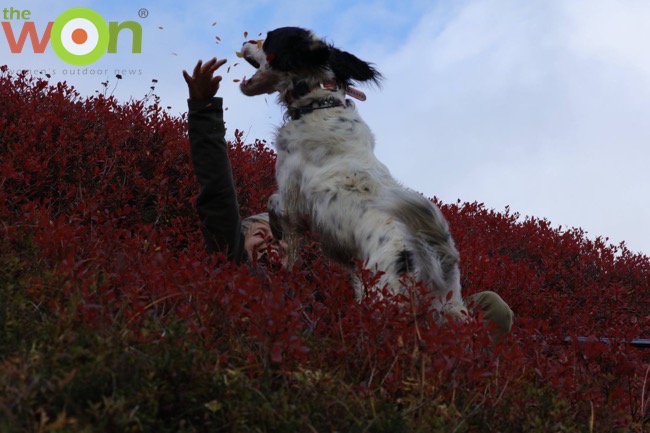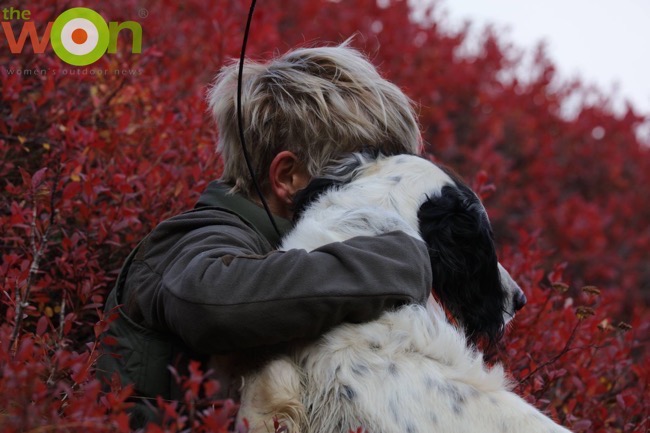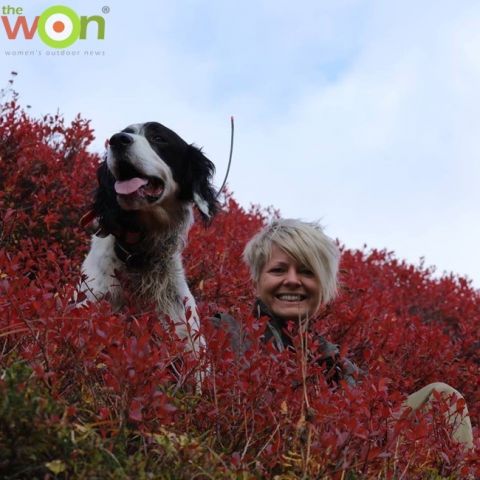Living and hunting with 10 bird dogs has tested my limits at times. Those of us who own gun dogs work hard to train our canine partners to point, flush and retrieve, but dogs can also teach us how to stop, look and listen. They are still close enough to the natural world that they demonstrate many of the healthy mental, physical and even spiritual habits we strive toward. Here are just some of the healthy habits I’ve learned from hunting dogs.
Rise and Stretch
The first face I see in the morning is often that of my English setter, Boss. He stands up, yawns and stretches. In contrast, I pet his ears, roll over and hit the snooze on my alarm before falling back asleep. Stretching first thing in the morning and throughout the day provides an energy boost, improves range of motion and circulation, and relieves tension. A good way to include stretching in your morning regimen is to add it to something that is already a habit, like brushing your teeth. During the day, replacing a sugar habit with stretching provides a similar uplift without the crash.

(Steven Meyer photo)
Readiness
One of the things that impresses me most about dogs is their constant state of readiness. While many hunters start a fitness regimen prior to a hunting season, dogs are usually ready to go. My point here isn’t that training isn’t valuable for dogs and humans. Dogs, perhaps because they lack gainful employment or a mortgage, are closer to the natural world, where they are always ready for adventure and accustomed to walks and runs. A good way to practice readiness is to observe when we fall into automation—the drive to work, or standing in line at the grocery store. When we have lost our ability to be present, we lose some of life’s best opportunities for curiosity, creativity and joy.

Bridges aren’t so scary once you cross them.( Steve Meyer photo)
Receptivity
Dogs turn their heads when they hear words they know—but more often, it seems they are listening to the nonverbal content of human communication. As far as I can tell, they are not thinking of what to say next. If I focus on listening rather than being heard, then when it is my turn to say something, it is usually more appreciative and relevant. Winchester, my first English setter, is the most “wide open” dog I have ever seen hunt. He runs a marathon in the mountains in search of birds. His athleticism puts me to shame, but the way he looks at me and the world is an even better quality: He takes in the wholeness of a person or experience, rather than an understanding limited by words.

(Steven Meyer photo)
Relaxation
When I am camping, or in any environment removed from a clock-based schedule, my sleeping habits fall more in line with the long sleep at night/ shorter naps during the day pattern of my dogs. Napping improves my mood, recharges my energy and stimulates creativity. When falling into a dog-like nap is too difficult or my mind won’t allow it, I practice conscious relaxation by taking notice of what enters my mind and observing those thoughts without judging. Next, I physically relax any part of my body that is tense. Whether or not I actually fall asleep, taking the time to rid myself of mental and physical stress provides many of the same benefits as napping.

(Steven Meyer photo)
Restoration
After a day in the field, I notice the way my dogs groom and care for themselves. They are especially attentive to their paws—unlike us humans, who have a tendency to abuse and neglect our feet. Shoes protect us from stickles and other surfaces, but they can also weaken our arches and cram our toes. A little time spent caring for my feet each day has improved my posture and balance. Foot care can include everything from a simple massage to a routine that includes interlacing the fingers between the toes, flexing and extending the foot, and doing ankle rotations.
Gratitude
The sight of a dog’s wagging tail is one of the “seemingly unremarkable” things that makes me happiest. It suggests gratefulness and joy. Since we don’t have tails, we aren’t nearly as adorable as an excited puppy or a hunting dog when you grab your shotgun, or whatever it is that lets him or her know adventure is imminent. Being grateful is the antidote to nearly every negative thought that enters my mind. Whether gratitude comes in the form of a relaxed state of mind or an overwhelming state of joy, it’s an acknowledgment of the best things in life. And, if I had a tail, I’d wag it. Instead, I make sure to smile often. Just the act of smiling is a physical expression of gratitude.

(Steven Meyer photo)
Live Each Moment
One of the greatest gifts of living and hunting with dogs is the way they connect us to the natural world. They find us birds, but we also find ourselves caught up in seeing the world their way. They live in the moment and observe life without human worry, regret or fear. They don’t live nearly long enough, but if we’re lucky, we’ll find a way to live each of life’s moments as fully as they do.
Christine Cunningham is a lifelong Alaskan, author and outdoor columnist known for her contributions to outdoor magazines and her commitment to creating opportunities for women to connect and share their stories. Her first book, “Women Hunting Alaska,” profiles some of Alaska’s most outstanding female hunters. View all posts by Christine Cunningham